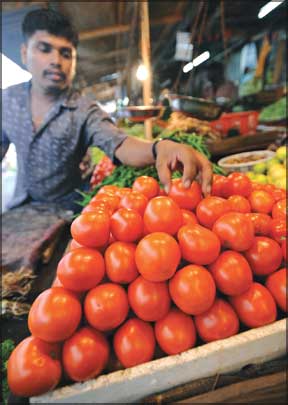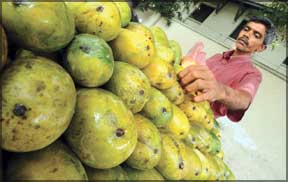
Go organic
Food for thought:
Charmaine FERNANDO
"To eat is a necessity, but to eat intelligently is an art."
- La Rochefoucauld
Food is defined as, any substance usually composed of carbohydrates,
fats, proteins and water, that can be eaten or drunk by an animal,
including humans, for nutrition or pleasure according to Wikipedia, the
popular on-line encyclopedia. It further states that items considered
food may be sourced from plants, animals or other categories such as
fungus or fermented products like alcohol. Food is harvested through
hunting and gathering and today most cultures use farming, ranching, and
fishing,' it outlines.
|

Buy healthy and eat healthy |
What has been given less or no place at all, is what looms larger
than life; like a monster; unethical production of foods unfit for human
consumption. Some preservatives, additives and chemicals used by food
producers today make food a threat to health and human life. Unethical
practices of food production in a mass scale for the sole purpose of
profit gain have become the order of the day and pose a globe-spanning
health hazard in the current context. People's lifestyle changes have
prompted convenience-food chains that have popped up like mushrooms,
lining the roadside selling drive-in fast-foods over the counter.
Gastronomy against a global scenario
Each country has its own taste-traditions, have a recognizable
cuisine, each value a specific set of cooking traditions, enjoy
preferences and practices, the study of which is known as gastronomy.
This also includes a complex food trade which helps the cultures to
economically survive through the sale of food, not only through
consumption. The fact, how healthy or not certain foods are, for us and
for the environment, is a hotly debated topic among experts and
consumers alike, and there are no over the counter answers either.
But when people at the forefront of food safety are asked, the one
simple question, 'What foods do you avoid?' a research team in USA had a
surprise coming. They got some pretty interesting answers which would
wipe common perceptions off their footing, like a sand storm. Although
these foods don't necessarily make up a "banned" list, their answers
pose, some staple food for serious thought.
Canned tomatoes and chromosomal damage in children
Canned food pose a health hazard when the inner lining lets loose
harmful chemicals. The resin linings of tin cans contain bisphenol - A,
a synthetic estrogen that has been linked to ailments ranging from
reproductive problems to heart disease, diabetes, and obesity.
Unfortunately, acidity (a prominent characteristic of tomatoes) causes
BPA to leach into your food. Studies show that the BPA in most people's
body exceeds the amount that suppresses sperm production or causes
chromosomal damage to the eggs of animals. "You can get 50 mcg of BPA
per litre out of a tomato can, and that's a level that is going to
impact people, particularly the young," says vom Saal. "I won't go near
canned tomatoes says Fredrick vom Saal, PhD, an endocrinologist at the
University of Missouri who studies bisphenol-A

You do have a solution. Always there is one just a split hair away
from the real problem! Choose tomatoes in glass bottles which do not
need resin linings. You can also get several types in tetra pack boxes.
So? Packaging is crucial when it comes to foods, especially acidic
foods, remember?
Grass-fed beef or corn fed beef? It matters
Cattle evolved to eat grass, not grains. But farmers today feed their
animals corn and soybeans, which fatten up the animals faster for
slaughter. More money for cattle farmers and lower prices at the grocery
store means a lot less nutrition for us. A recent comprehensive study
conducted by the USDA and researchers from Clemson University found that
compared with corn-fed beef, grass-fed beef is higher in beta-carotene,
vitamin E, omega-3s, conjugated linoleic acid (CLA), calcium, magnesium,
and potassium; lower in inflammatory omega-6s; and lower in saturated
fats that have been linked to heart disease.
"We need to respect the fact that cows are herbivores, and that does
not mean feeding them corn and chicken manure," says Joel Salatin,
co-owner of Polyface Farms and author of half a dozen books on
sustainable farming.
|
 
Keep away from the preservatives and make sure that there is
nothing artificial about what you eat |
As the only solution buy grass-fed beef, which can be found at the
local beef stall. So far so good; our farmers or stray cattle eat
nothing but grass because they don't get to eat anything else. It's not
a flourishing industry yet, in Sri Lanka. Imported beef unless it's
usually labelled, refrain from buying, because it demands a premium. If
you don't see the label, forget the beef and concentrate on the next
item on the list. It's best to avoid tinned imported meat products.
Better be safe than sorry. Buy your meats fresh from the butcher
locally, if you must.
Non-organic potatoes absorb chemicals!
Root vegetables absorb herbicides, pesticides, and fungicides that
wind up in soil. In the case of potatoes, the nation's most popular
vegetable, it's treated with fungicides during the growing season, and
then sprayed with herbicides to kill off the fibrous vines before
harvesting. After they're dug up, the potatoes are treated yet again to
prevent them from sprouting. "Try this experiment: Buy a conventional
potato in a store, and try to get it to sprout. It won't," says Moyer,
who is also farm director of the Rodale Institute. "I've talked with
potato growers who say point-blank they would never eat the potatoes
they sell. They have separate plots where they grow potatoes for
themselves without all the chemicals. Jeffrey Moyer, is the Chairman of
the National Organic Standards Board. Buy organic potatoes. Washing
isn't good enough if you're trying to remove chemicals that have been
absorbed into the flesh.
If you refuse to get duped in to eating pink salmon when you are in
the pink of health have another think coming. Just switch to wild-caught
Alaska salmon if you can have a wild-guess as to their identity through
a tin can. If the package says fresh Atlantic, it's farmed.
There are no commercial fisheries left for wild Atlantic salmon. Not
anymore. Good thing you tore that Green Card! Three cheers for good old
Sri Lanka!
In Sri Lanka we buy salmon over the counter without knowing any facts
about how these tin-canned fish get farmed. Time to think twice before
you make those fish cutlets or give your family imported fish. Remember
we belong to the third world where the estimation weighs way down low.
We should be amazed if anything of quality ever came our way from
overseas, on a trade platform. Think wisely before you buy tinned fish.
They smell fishy!
Whether you want to relax at home and eat the canned pink salmon
watching Nimoor or catch the excitement trout-fishing at Mahaweli with
your clan is up to your attitude to decide. But choose wisely; because
it's you and your family that will have to pay the price!
Milk produced with artificial hormones
Check labels for rBGH-free, rBST-free, produced without artificial
hormones or organic milk when you purchase milk, if you want to buy the
safe product. These phrases indicate rBGH-free products. Now do we do
that? Watch what you give your kids and family. Naturally we all want to
stay healthy.
Ask your doctor or child specialist. They should be in a position to
give you best advice.
Conventional apples
The only way to eat an apple is to buy organic apples.
How do we find out that? The importers who fill the pavements and
fruit stalls with red, pink and green apples need to tell us that,
right? Is there a consumer authority that looks in to these valid
details before they stamp clearance to dump Sri Lanka with imported
chemically drenched apples and other fruits that we lovingly take home
to our sons and daughters on our way home? What is the guarantee that
our future generation will not end up in hospital beds for the rest of
their lives?
If you can't afford organic, be sure to wash and peel them first.
Apple a day, in the modern context, will increase your hospital stay!
What a twisted world sans ethics! From producer to consumer the go
between is 'pure chemical'! Watch out for imports! Grow your own home
garden if you want to stay healthy.
If you don't have a garden, use a clay pot. Take some pain to grow at
home whatever you can manage to grow thereby lessening your chances of
dying a painful death. Life is too wonderful to let a fish or an apple
to get you down. Keep your chin up and get that garden spade, bend, dig
and hey presto! Dig out a shapely figure too. You see turning to nature
the way The Creator made it is the best suited system for people.
Believe me, when we try to refine what the Creator has created, the
problems begin. You don't have to look far; just listen. The climate
change is knocking at your own door. Get your life jackets on.
The solution for the problem lies in leaving nature alone. Enjoy its
goodness. Grow in wisdom.
Live long! |



